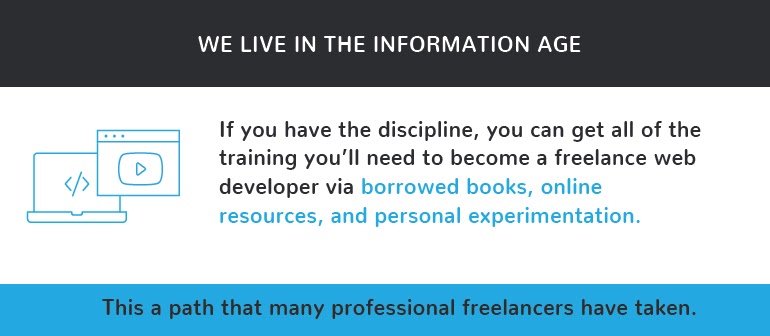Tech needs of a typical corporation are greater today than they have ever been before. To stay ahead of the competition, companies require developers for everything from websites to mobile apps. Developers are always in demand, and because of this they often enjoy very generous pay.
When you embark on a career in software development, you’ll have a very important decision that can affect your career path for the next several years: Should you seek the security of a full-time development position, or should you embrace your entrepreneurial side and become a freelance developer? Both choices have significant benefits and drawbacks. We hope that this overview will make your decision an easier one.
Freedom vs. Security
Freelance
As a freelancer, you have the freedom to choose the jobs that you wish to accept. If a job’s pay rate is unattractive — or you don’t believe that taking the job would further your career goals — you can turn it down. As a freelancer, you may also find that you have a much greater variety of jobs from which to choose. Many companies lack the funds to hire developers, so they use freelancers as necessary to complete small projects.
Full-Time
On the other hand, working as an employee offers security that freelancing doesn’t; salary, benefits, and other perks. As an employee, you don’t have to worry that you’ll suddenly have no reliable source of income because your client list has dried up. Firing an employee isn’t a decision that companies take lightly. If a company hires you — and you perform well — you can generally expect to keep your position indefinitely.
Ongoing Training
Freelance
To be successful as a freelancer, you’ll need to remain abreast of the latest trends in coding and understand how to use the most popular languages and development environments. It will be your responsibility to devote the time and funds necessary to train yourself and make sure that you always have the skills clients demand the most. We all know the “head-against-the-wall” path of teaching yourself.
Full-Time
It is often necessary for companies to make sweeping changes in the technologies that they use due to customer demands and trend. If you’re an employee of a company that makes a significant technological change, normally your are learning in a collaborative and team environment. Typically the company should provide any necessary training, information, or even courses to get their employee based skilled up to perform the task at hand.
Work-Life Balance
Freelance
As a freelancer, you’ll have the ability to work at home and potentially spend more time with your family than you would in a full-time development position. Keeping due dates in mind, Freelancers sometimes struggle with work-life balance issues as well. If you are always available to your family, they may sometimes forget that you’re sometimes “at work” even if you’re at home. The luxury of deciding when to work and when not to work is up to you as you are your own boss. Working as a freelancer, though, you’ll spend much of your time alone. If you crave social interaction during work, freelancing is not the best way to get it.
Full-Time
Development is a stressful job. When a company has set a firm release date for a software project, developers often spend several weeks or months working longer hours than normal as the date approaches — and spending far too little time with their families.
Many companies have become more mindful of their employees’ stress levels in recent years. If you’re fortunate, you may find an employer that works hard to help you maintain a healthy work-life balance. Nevertheless, crunch time is a reality for most software developers.
Working as an employee means that you’ll have the camaraderie and healthy competition that comes with having peers.
Motivation
Freelance
As a freelancer, you won’t have the same level of external motivation. You’ll need to generate the internal motivation necessary to complete your projects quickly, get paid and move on to prospecting for new gigs. If you allow yourself to become complacent, you’ll eventually suffer.
Full-Time
Being an employee means that you have to deal with performance reports, management, and rules. You’ll have a boss who periodically tells you to speed up or get back to work. This can be a double edged sword. The constant push from superiors can either succeed in motivation or demotivate you entirely.
Finances
Freelancers Can Earn More — Eventually
Any freelancer is also a part-time salesperson. For many jobs, you’ll compete with overseas developers willing to do the work for much less than you. You’ll need to sell yourself every time you put in a bid. You’ll need to explain every time why it is worthwhile for the client to pay more for your services. Eventually, you’ll build up a base of regular clients.
Working as a freelancer may mean that you’ll eventually earn more than a full-time developer would. However, getting to that point may require you to spend thousands of hours prospecting for new clients and completing assignments for little pay.
The good news is that the Internet has made finding work much easier for freelancers than it once was. Websites for posting and completing freelance work — such as Upwork — have become very popular. Websites for freelancers often have plenty of work available. Much like an employer would, they’ll pay you on a consistent schedule.
You can also find work as a freelancer by creating your own website and looking for work on websites for classified ads such as Craigslist. You may even find potential clients in your own area looking for freelancers. By finding work independently and negotiating your own pay, you may earn more than you would through a website such as Upwork. However, you’ll also be responsible for writing your own contracts and collecting your fees. You could lose a great deal of money if a client refuses to pay after you’ve spent hours completing the requested work.
When you finally do begin to receive higher-paying assignments, you’ll need to set aside a significant portion of your earnings to pay your taxes. Self-employed individuals pay the highest tax rates in the United States. Some freelancers set up S corporations and take their wages as salaries and dividends. However, creating an S corporation will only reduce your taxes slightly. As a self-employed individual, you’ll also have to pay for your own healthcare coverage and retirement savings.
Employees Earn Less — but They Get More
Working full time usually means that you’ll receive a guaranteed paycheck. Although you may have to learn to work within your company’s political system if you’d like to earn a promotion eventually, you won’t have to spend nearly as much time selling yourself as you would when freelancing. You also won’t have to spend any time prospecting for new work unless you’re looking for a job with another company.
An employee of a company often earns less than a freelancer. However, you’ll get to keep more of what you earn as an employee because your employer will pay half of your Social Security and Medicare taxes. If your employer provides health insurance and contributes to your retirement fund, those contributions will add substantially to your effective income.








